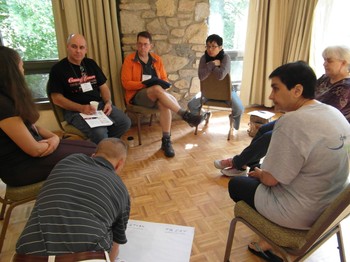Those gathered for the Presbyterians Caring for Chaplains and Military Personnel (PCCMP) annual training conference here focused on self-care for chaplains and their families.
PCCMP has 257 chaplains under its daily care, with 114 of them serving in full-time chaplain positions. These men and women spend their days caring for soldiers and sailors, fulfilling spiritual needs with worship services and Bible studies, but also acting as confidantes and counselors while enduring separation from family and friends just like those they serve.
Who ministers to the ministers? That’s where PCCMP and the retreat, held Aug. 4-7 at Montreat Conference Center, come into the picture.
“This is about making connections. We’re a connectional church, so this is about them making connections so they can take care of each other,” said the Rev. Don Wilson, associate director of PCCMP.
This year’s event brought together 48 chaplains and their families. The quiet and natural setting of Montreat encourages families to reconnect and spend some time together, away from “civilization” and all the burdens of daily life.
Mornings were devoted to education, with chaplains and spouses attending a two-day workshop given by Captain Mark W. Smith, United States Navy Force Chaplain, Commander, Naval Surface Force U.S. Pacific Fleet. Smith led the group in identifying factors that can cause trauma or stress and then in identifying resources that can be used to cope with and balance those vulnerabilities.
These vulnerabilities can range from things like being passed over for promotion, to deployments, to moves for the entire family as duty stations change, to dealing with deaths within their unit. Death, in particular, can be a difficult situation for chaplains.
“We cannot break down in front of the troops,” said Smith. “We’re expected to maintain the appearance at all times that our faith sustains us. We’re always expected to be strong. We sometimes take that into our personal life as well. We’re not allowed to express our grief like other people.”
Chaplains cited online resources, relationships with other chaplains and support from family as coping tools.
Communal meals in the dining room of Assembly Inn, along with a sunrise mountain hike, provided opportunities for chaplains and families to connect across distances and different branches of service.
Evenings were a time for worship followed by opportunities for fellowship and entertainment as a group, with an ice cream social on the opening night and a concert on the second.
Heath Rada, moderator of the 221st General Assembly of the Presbyterian Church (U.S.A.), joined the participants for dinner and worship on the final evening of the conference.
Wilson and the Rev. Larry Greenslit, director of PCCMP, were both thrilled that Rada made time to visit with the PCCMP. Both saw it as acknowledgment from the larger church of the importance and value of the work PCCMP does, as well as what the chaplains do and what they and their families sacrifice for country.
“The visit by Heath and Peggy Rada was very much appreciated by our chaplains and their families. His words of encouragement and support for the work that chaplains do, his understanding of the sacrifices made by all military families and his perspective on current issues within our denomination made for a memorable visit,” Greenslit said. “He went above and beyond by participating in a communion liturgy with us. All in all, his pastoral presence, and the warm manner in which Peggy engaged chaplain spouses, provided a boost to our chaplains and their family members.”
Toni Montgomery is a freelance writer in Statesville, N.C., where she is also secretary for First Presbyterian Church.

